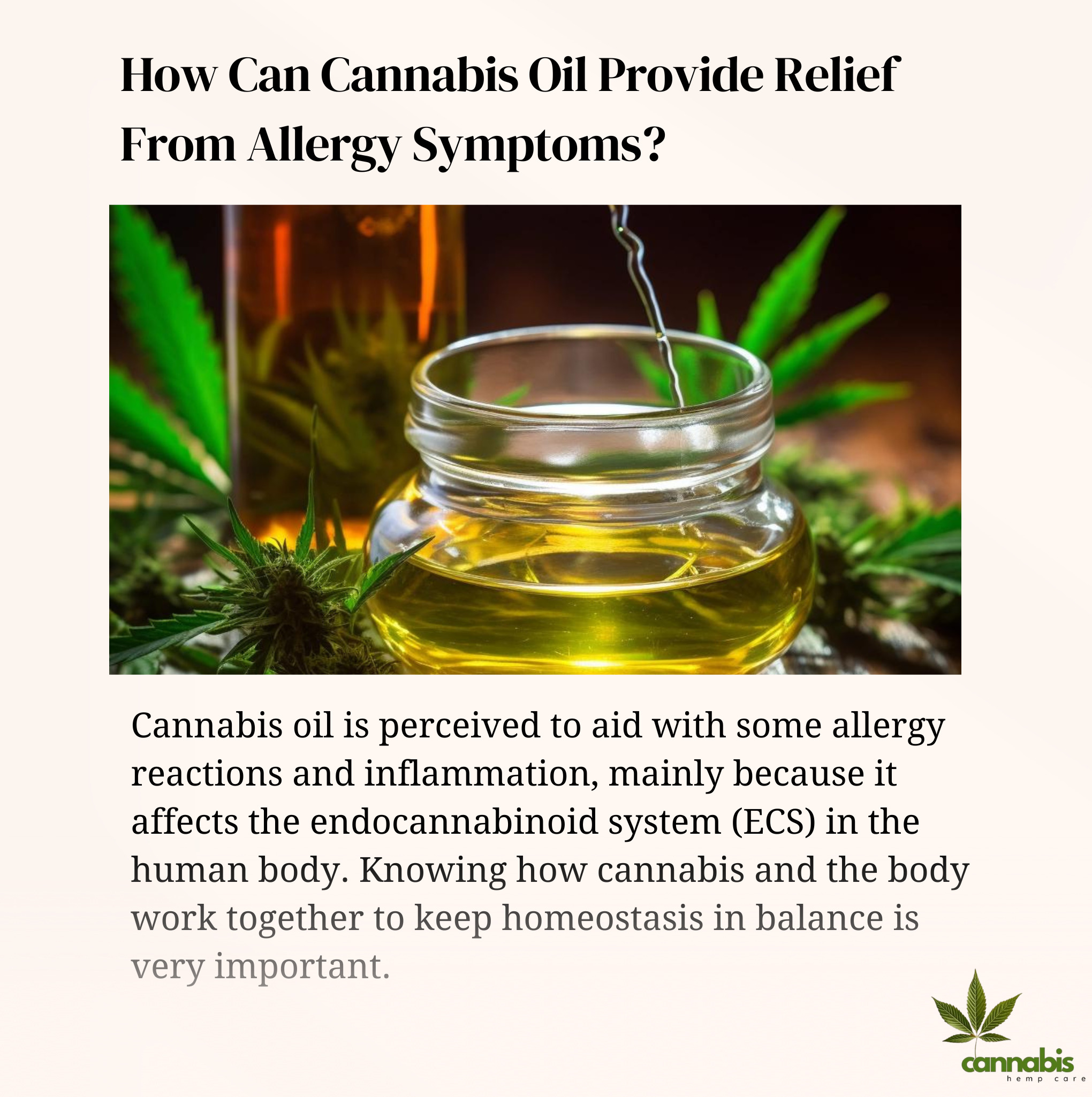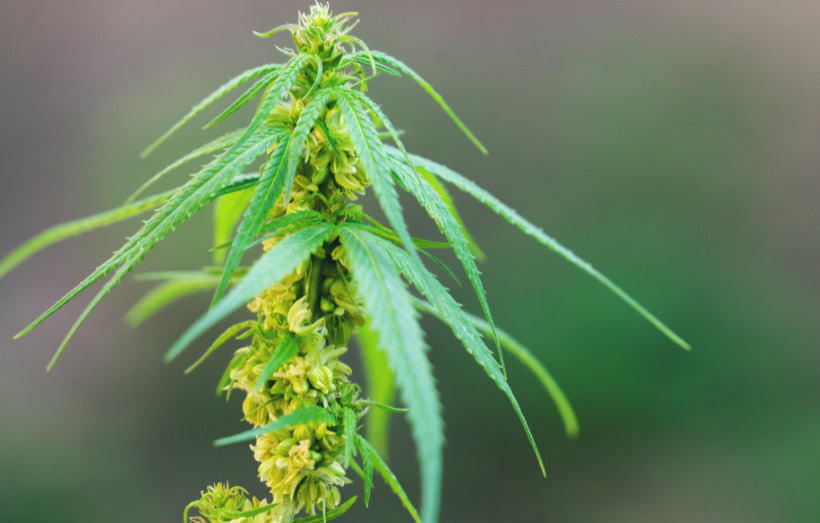Cannabis oil has anti-inflammatory properties that could make allergy symptoms less severe. But there is still no solid proof that it works to treat allergies. Notably, some people can be allergic to cannabis, which can cause symptoms like coughing, a stuffy nose, and welts on their bodies.1
It’s essential to be aware that the medical use of cannabis oil is still controversial, and legality differs in different places. Before using cannabis oil or other medicine to treat allergies, talking to a healthcare professional or provider is best.
Understanding Cannabis Oil
Cannabis oil is derived from the cannabis plant. In its unrefined state, it possesses roughly the same active compounds as its source plant, though the proportion of these compounds varies based on the specific plant variant. The primary active components in the cannabis plant are cannabidiol (CBD) and delta-9-tetrahydrocannabinol (THC). Hemp-derived oils might exhibit a higher Cannabis oil concentration, whereas oils from other cannabis strains might have elevated THC levels. THC is responsible for the psychoactive effects associated with recreational cannabis, whereas medical-grade oils predominantly feature Cannabis.2
How Can Cannabis Oil Provide Relief From Allergy Symptoms?
Cannabis oil is perceived to aid with some allergy reactions and inflammation, mainly because it affects the endocannabinoid system (ECS) in the human body. Knowing how cannabis and the body work together to keep homeostasis in balance is very important.
Even if you don’t use cannabis oil, everyone has an ECS, an important system whose job is to keep your body stable. The ECS makes it possible for the nervous system, immune system, and organs to work well. Let’s break it down for a clear understanding.

1. What’s the Endocannabinoid System (ECS)? Imagine the ECS as your body’s manager, ensuring everything functions harmoniously.
2. The Role of the ECS Without Cannabis Oil: All of us, cannabis oil users or not, have an ECS. It’s like the body’s natural balancing act, ensuring systems like our brains and immunity work properly. If the ECS isn’t functioning well, you might feel out of sorts, similar to a seesaw tilting too much to one side.
3. Enter Cannabis: Cannabis introduces compounds that can help the ECS do its job better, making sure everything in the body runs smoothly. By taking cannabis, you’re giving your body’s manager some assistance.
4. Cannabis and Allergies: There’s a connection between cannabis oil and allergy relief. Current research, though limited, hints at cannabis potentially easing allergy symptoms. In essence, by helping the ECS, cannabis can play a role in mitigating allergic reactions.3
Although the connection between cannabis oil and allergy relief is interesting, is ensconced in nascent stages of scientific exploration. To find out how well cannabis works to treat allergies, we need to do a lot of study and clinical studies.
Cannabis Oil Vs. CBD Oil For Allergy
It’s important to know the differences between Cannabis Oil and CBD Oil, especially when thinking about how they can help with allergies. Here is a table that compares the two and shows how they are different.
| Feature | Cannabis Oil | CBD Oil |
|---|---|---|
| Definition | An oil infused with cannabis extract high in THC is synonymous with marijuana and THC oil. | An oil extracted from industrial hemp, low in THC. |
| THC Content | High (usually significantly higher than CBD Oil) | Low |
| Derived From | Recreational or Medicinal Cannabis | Industrial Hemp |
| Usage | Recreational or Therapeutic (due to high THC content) | Therapeutic (due to low THC content) |
| Market Labeling | Sometimes labeled as CBD oil to appeal to a wider customer base | Commonly labeled as CBD Oil |
| Effect on Allergies (Theoretical) | It might offer relief due to its high THC content, which has anti-inflammatory properties | Known for its anti-inflammatory properties, it is potentially beneficial for allergy symptoms. |
It is significant to recognize the difference between cannabis oil and CBD oil, especially if you are considering using them to treat allergies. As you can see, their origins are the primary components. If you understand them well, you can make better choices about how to use them.4

Cannabis Allergy Symptoms
If you have allergic symptoms, it is important to figure out where cannabis oil allergies come from, and you need to recognize the difference between a true cannabis oil allergy and allergic reactions to substances found in cannabis oil. These are some symptoms If you smoke and have a cannabis allergy, you may experience:
- Redness of the eyes
- Watery eyes
- Allergies in the nose
- Bleeding from the nose
- Sneezing
- Nausea
An actual cannabis oil allergy, on the other hand, is caused by a negative response to specific chemicals found in the cannabis plant. Multiple components in cannabis may be allergenic, implying a range of allergy reactions depending on the chemical in question.5
Consultation With Healthcare Professional
If you have a severe allergic reaction to cannabis oil manifesting or if irregular breathing symptoms commence, prompt medical attention is imperative. It’s advisable to visit a healthcare provider without delay to ascertain the allergy’s severity and obtain appropriate medical guidance. Engaging in self-diagnosis or delaying seeking professional care may exacerbate the condition, potentially leading to more serious respiratory complications or other adverse allergic responses. Ensure to communicate any interactions with cannabis to the healthcare provider for an accurate assessment and appropriate medical intervention.

Conclusion
The potential of cannabis oil to address allergies remains a topic of interest in medical research. While there are indications that the anti-inflammatory properties of cannabis oil might offer relief from certain allergy symptoms, comprehensive and definitive evidence is still forthcoming.
As with any alternative treatment, individuals need to consult with healthcare professionals before considering cannabis oil as an option for allergy management. Until further studies are conducted, the efficacy of cannabis oil in treating allergies remains inconclusive.
FAQs
Sources
- “Allergic to Marijuana: Symptoms, Causes, and Diagnosis.” Www.medicalnewstoday.com, 3 Aug. 2018, www.medicalnewstoday.com/articles/321343. Accessed 2 Oct. 2023. ↩︎
- Sample, Ian, and Ian Sample Science editor. “What Is Cannabis Oil and How Does It Work?” The Guardian, 19 June 2018, www.theguardian.com/society/2018/jun/19/what-is-cannabis-oil-and-how-does-it-work#:~:text=Cannabis%20oils%20are%20extracts%20from. Accessed 2 Oct. 2023. ↩︎
- London, Glow Bar. “How CBD Can Provide Relief from Allergy Symptoms?” Glow Bar London, glowbarldn.com/blogs/cbd-and-medical-conditions/provide-relief-from-allergy-symptoms. Accessed 2 Oct. 2023. ↩︎
- “The Difference between CBD Oil and Cannabis Oil – RQS Blog.” Royal Queen Seeds, www.royalqueenseeds.com/blog-the-difference-between-cbd-oil-and-cannabis-oil-n616#:~:text=Each%20one%20is%20an%20oil. Accessed 2 Oct. 2023. ↩︎
- “Can You Be Allergic to Cannabis?” Healthline, 2 Nov. 2017, www.healthline.com/health/allergic-to-marijuana#symptoms. Accessed 2 Oct. 2023. ↩︎




































